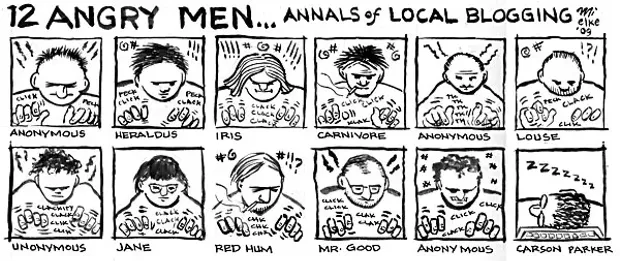
As usual, I forgot to wish Waldo a happy birthday August 1. He turned nine.
Like a reliable sitcom whose producers refused to jump the shark, Waldo has outlived his two spinoffs, Waldo at Home, and Cooking With Waldo. His biggest audience remains the spamcrawlers of Russia, and their cousins in China, Slovenia, Ukraine and Romania.
US readers are #2 with about a third of page views, and Waldo has minuscule followings in the UK, France, Spain, and Italy. His most popular post remains his shortest: on August 11, 2014, under the title, "Well, damn." Waldo wrote, "Robin Williams is dead."
164, 952 visitors have honored Waldo with a visit. They don't stay long. The average read is 2.2 pages.
Blogs, I suspect, are dying off with their owners. A 2006 report by Sysomos found only 7.1% of bloggers were over 51 years of age- spot on for me. A few years before that, a fairly widely-traveled article said the average lifespan of blogs with huge followings was only about three years.
In 2016, an article appeared in The Guardian that made me fell like a man who opened the world's most modern buggy whip factory in, say 1916:
Between 2002 and 2006, it seemed you could hardly move a digital muscle without someone proselytising about the rise of blogs and their potential impact on marketing and communication.
The buzz prompted an outpouring of personal journal entries, and the emergence of tools such as Technorati to index them all. By 2008, 41% of UK internet users had visited a blog, according to comScore.
And then, it seemed, the blog went bust. Blogging by US teens halved between 2006 and 2010 and declined among millennials, according to PewResearch. Technorati, while still operational, is now a mere footnote to the format.
It was no mere coincidence that during this period we saw the mainstream adoption of social networks such as Facebook and microblogging platforms Tumblr and Twitter. These services allowed users to express themselves through short updates or single-click republishing. Their rise was further reinforced by the prevalence of smartphones, since mobile expression demands the short form. Consequently, blogs fell off the radar.
Jason Kottke, one of the most celebrated of blogging's old guard, who has been at the coalface for 16 years, recently declared "the blog is dead". If that's the case, we should all enjoy the afterlife. The "death" of blogs may be an exaggeration – but it's also great news for anyone connected with the format in terms of media and marketing.
Blogs haven't disappeared – they have simply morphed into a mature part of the publishing ecosystem. The loss of casual bloggers has shaken things out, with more committed and skilled writers sticking it out. Far from killing the blog dream, this has increased the quality of the blogosphere as a whole.Waldo averages 5-6,000 page views a month, having peaked at 11,000 in July 2010. It was probably higher in 2008, when Waldo had a vogue among South Carolina political bloggers (all but one of which are long gone), but I don't remember. Laurels wither fast on the internets. All told, I cranked out about 14,000 Waldoposts these last nine years, then excised about two-thirds in 2013.
Waldo's come full circle, moving non-political topics back into the mix after eight years at Waldo at Home. One halfway decent blog beats three crappy ones, I reckon.
I go from year to year now. Next year will be Year Ten. Maybe I will keep on, maybe a decade of blabber will finally strike me as enough, long after it did my long-suffering handful of readers.
No comments:
Post a Comment